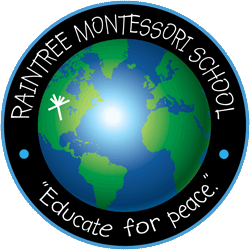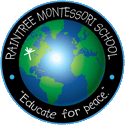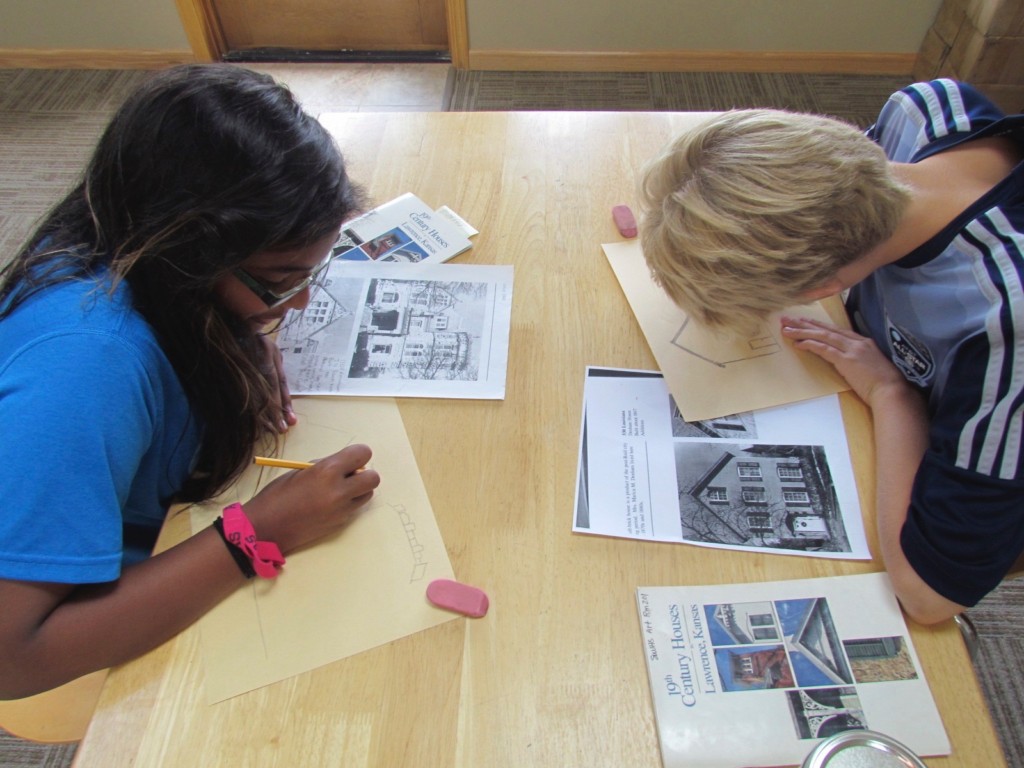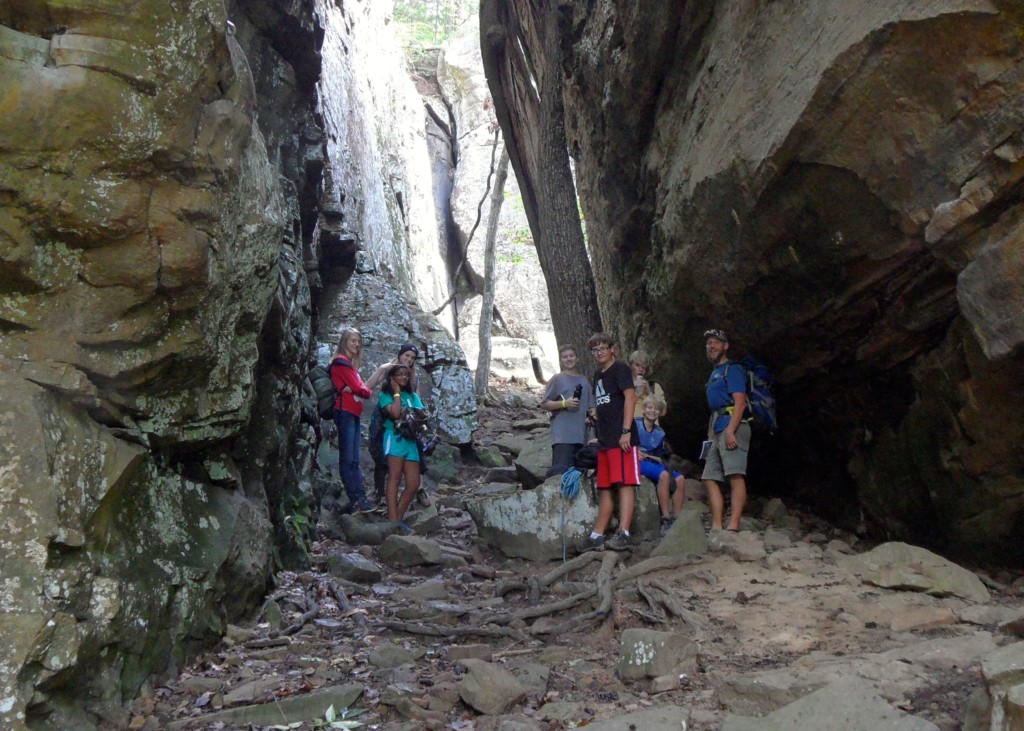Erdkinder
A day in the life of a Raintree Erdkinder student
At 8:15, the rest of the students arrive, put belongings in their lockers, visit with friends and gather their materials for their morning classes.
At 8:30, student-led morning announcements begin. Roll is taken and special announcements are made. Students make notes in their planners as needed regarding the day’s events and assignments.
On Mondays, Tuesdays, and Thursdays at 8:45, students transition to either Humanities or Occupations (depending on the week). Humanities and Occupations projects alternate in two week sessions.
Humanities projects connect our adolescents with the stories of other people. By studying our history and the histories of other cultures, the student develops gratitude and faith in the general ‘progress’ of humanity. Our purpose is to impart upon students the belief that every individual has the potential to contribute to the greater good of society. In our Humanities sessions, the Montessori three-period lesson approach is used. The first period offers an invitation to the students. This invitation takes the form of key lessons, which serve to unlock or reveal the scope of the project. In the second period, students engage in group or individual work in order to delve deeper into the historical time period. Engagement comes from reading more about a specific topic of interest, having a dialogue with an expert, debating with classmates, researching documents in another library, or studying the art, music, and literature of that time in history. The adult is there to give feedback, aid in research, facilitate discussions of issues and interpretations, and check in with students. The third period is a demonstration by students of their understanding and mastery of the time and place studied. This can be done by way of written assignments, oral presentations, creative expressions, enacted timelines, dramatis personae monologues, reenactment of historic events, PowerPoint presentations, puppet shows, collective poems, and ceremony reenactments. The opportunities are endless.
Occupations offer purposeful engagement that initiates development of the self and opportunities for valorization. Work on the land is a ‘limitless field for scientific and historic studies.’ At times, the occupation projects center around the development of a micro-economy, such as raising chickens and marketing their eggs. As in the Humanities projects, the three-period lesson approach is used. First, a task or a challenge is identified from the land or the community. The group decides that they want to sell eggs to raise money for their Odyssey trip. Second, the students decide what they need to know and what they need to do in order to accomplish the task or solve the problem. As a group they work to acquire the knowledge and proficiency necessary to accomplish the task. Key lessons are given by the adult to build up knowledge. Finally in the third period, students share their work and complete the task or solve the problem.
At 11:15, work is cleaned up and the students set up lunch. Eating together is a social time. Periodically students will have the task of planning the menu, shopping for ingredients, and preparing lunch for the group. On those days the students prepare not only the food, but they also set the table for a more formal lunch with placemats, cloth napkins, and a full set of silverware. The students are responsible for clean up everyday. Before the afternoon’s work begins, there is a brief period of silent reading.
At 12:30, math and language lessons begin. For this first year, the students may take their lessons together as a group, though eventually the group will be divided with some students in language lessons, others in math lessons.
Language
Montessori said that, “Words are the natural means of expressing thoughts and establishing understanding between men.” The study and fluency of more than one language in today’s society is paramount. Students in our program will study Latin and other languages including French, German, Spanish and Chinese.
Mathematics
The three-period lesson is used in the study of all subjects, but is particularly useful in the study of mathematics. Students begin where they left off at the end of the 6th year in the elementary, moving into the study of algebra and beyond. Lessons are presented using concrete materials. Students practice with the materials to solve problems and finally, students apply the concepts to real life problems. The approach is evaluative and diagnostic with the next lesson following after mastery.
At 3:00, the students clean up their environment, record notes in their planners and make plans for the next day.
Creative and Physical Expression
The adolescent has a great need for self-creation, deep friendships and love which can be expressed through the arts. The nature of the arts is to wed the emotional and the intellectual into unique, original expression. Art (in any form) has dual value: it is both a profound expression of the inner self and a profoundly effective avenue for connecting one human being to another. In contrast to academic work with a social context, the arts and physical exercise offer the most engagement because they allow for personal expressions within that context. The whole day is devoted to self-expression, pursing the study for six weeks. Half the day is devoted to the arts, half the day to physical expression.
Wednesdays are creative and physical expression. The morning may find the students in a ceramics studio getting a lesson from a potter on how to make a coil pot, maybe using clay that they unearth from the creek bed in the Back Forty. With each successive week, they learn to refine their techniques and learn about glazes and firing. In the afternoon, the students may learn how to play lacrosse or take a rowing lesson, perfecting their skills week-by-week.
On Fridays students have a community meeting to share information about the week and make plans for the following week. Issues that need the group’s input are discussed. Later in the morning the group will engage in Language Lab and Math Seminar. In Language Lab, students practice vocabulary and conversation skills in a foreign language. In Math Seminar, students share the process of solving problems that they have been working on for the week. The morning ends with a discussion of current events.
After lunch on Fridays, the students do community service both on- and off-campus. Community service on campus could be helping Jim with maintenance jobs, assisting in the toddler classroom, or reading to primary students. Off-campus community service might include taking donations to the homeless shelter or the humane society, or visiting people at local rest homes.
Click edit button to change this text.





